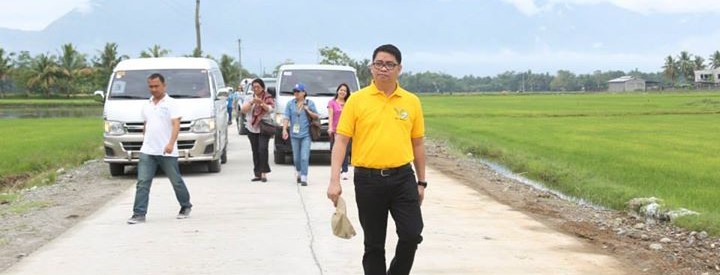 PRDP National Deputy Director visits one of the farm-to-market road sub-project in Sultan Kudarat during the WB Review Mission on January 27, 2015. (Photo by: Kathrino Resurreccion, DA-AFID)
PRDP National Deputy Director visits one of the farm-to-market road sub-project in Sultan Kudarat during the WB Review Mission on January 27, 2015. (Photo by: Kathrino Resurreccion, DA-AFID) P36.7-M roads to serve 2,000 ha in Sultan Kudarat town
About 2,000 hectares mostly planted to rice and 1,000 households have started to benefit from the ongoing construction of three road networks amounting to P36.7 million in Isulan, Sultan Kudarat.
Amalia Jayag-Datukan, Executive Director of Department of Agriculture-Regional Office 12 (SOCCSKSARGEN) said these three farm-to-market road (FMR) projects are funded under the Philippine Rural Development Project (PRDP), the scaled-up version of the Mindanao Rural Development Program (MRDP).
Said road projects include the concreting of Purok 2-San Martin FMR in Barangay Kudanding (95% completed; P18.6 million); concreting of Tayugo-Paladong FMR (38% completed; P 17.8 million); and concreting of Bual-Talitay FMR (30% completed; P16.2 million).
Isulan Mayor Diosdado Pallasigue shared that the concreting of said road sections has been identified as a top priority of the local government unit (LGU) given the critical role of FMRs in spurring agricultural growth.
“Since the 1970s, the accessibility of these roads has long been a problem especially during rainy season when the trails are not passable even to motorcycles and tricycles,” Pallasigue added.
Cesar Falle, Barangay Captain of Kudanding village, also shared similar sentiments, saying that since the 1970s these roads have been almost impassable and farmers have always had a hard time bringing their products to the market especially during rainy seasons.
“By the time we have reached the market, our rice grains would have been wet; that is why we had no option but to sell these at the lowest prices,” Falle said.
Because of these inaccessible roads, Falle added that they also used to spend P40.00 for every sack of rice to be hauled to the market.
“But now, the roads have been improved and transporting our products has become easier and cheaper; hence, the incomes of farmers have increased. Hauling our produce is no longer a problem since big trucks can now enter here,” Falle shared.
Falle further added that before, they had only known about government programs in stories; but now, they benefit from these themselves. According to him, they have also accessed other programs and projects of DA such as solar driers, rice seeds and farm machinery.
Pallasigue said that they are happy for these development interventions and at the same time proud for being the first recipient of infrastructure projects under the PRDP in the whole country.
“We thank the DA and World Bank for the PRDP because of the significant impact of the projects on our farmers. For 57 years, it is only now that they can benefit from a government program like this.” Pallasigue added.
The road projects were visited by the World Bank on January 27, 2015 as part of the team’s review mission for the PRDP’s kick-off implementation in the SOCCSKSARGEN Region.
The PRDP is a six-year government platform designed for an inclusive, value chain-oriented and climate-resilient agriculture and fisheries sector. It is implemented by the Department of Agriculture and jointly funded by the World Bank, the national government and local government units.
The Philippine government and the World Bank signed PRDP’s P27.5 billion loan-and-grant agreement on September 8, 2014. The financial package is intended for rural infrastructure as well as small business and livelihood projects for farmers and fisherfolk that aims to increase rural incomes and alleviate poverty. (LMSalvo/DA-RAFIS 12)
